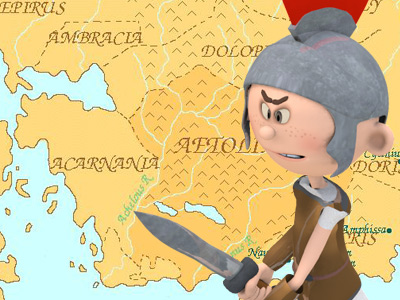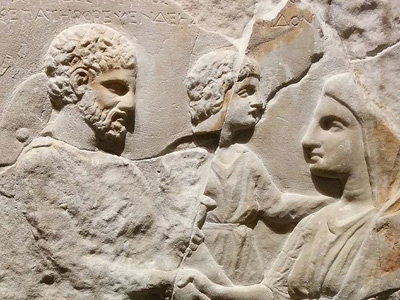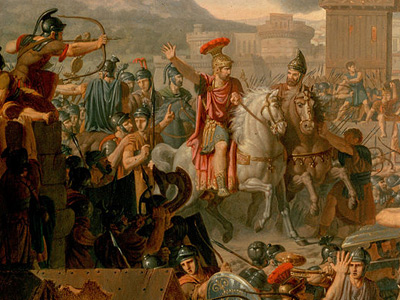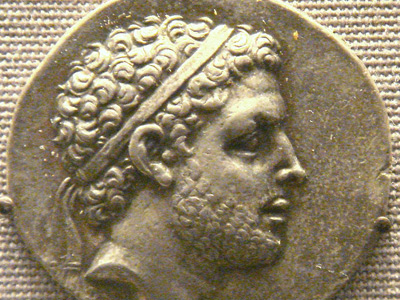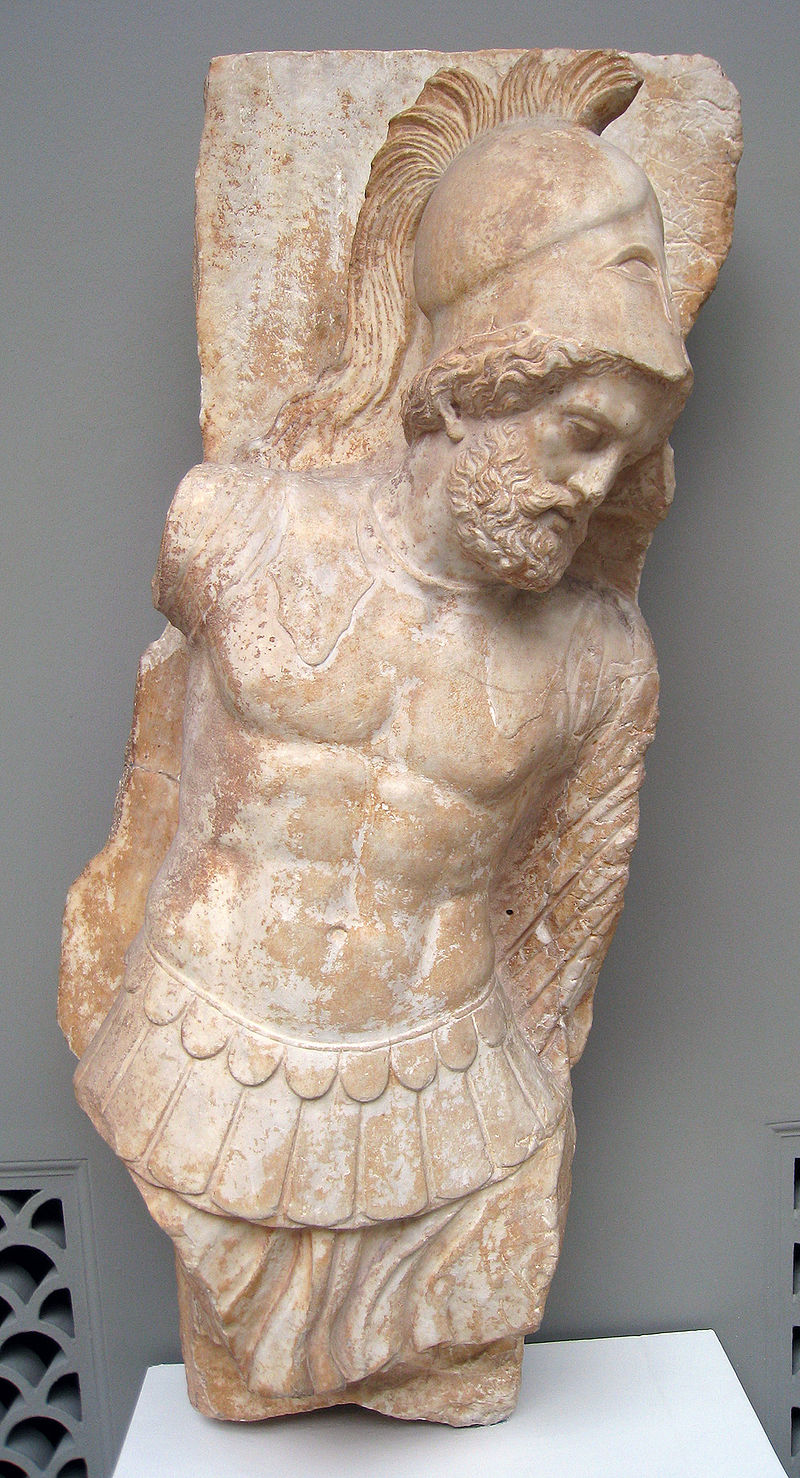Third Macedonian War (171–168 BC)
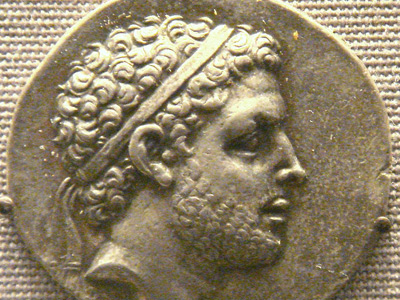
The Fourth Year of the War (168 BC)
The consuls for 168 BC were Lucius Aemilius Paulus (for the second time) and Gaius Licinius Crassus. Macedon was assigned to Lucius Aemilius and the command of the fleet was assigned to the praetor Gnaeus Octavius. The praetor Lucius Anicius, was put in charge of Illyria.
Preparations for the Campaign
Aemilius was very careful in the preparation of his campaign. He asked for a commission to find out if the troops were still on the mountains or had gone to the plain, to inspect the armies and the fleet, to report on what was required, whether the allies were still loyal, which states were hostile, the status of Perseus’ troops and the logistics for supplies. They reported that the Romans The Roman Republic was a form of government of Rome and the era of the classical Roman civilization when it was run through public representation of the Roman people. Beginning with the overthrow of the Roman Kingdom (traditionally dated to 509 BC) and ending in 27 BC with the establishment of the Roman Empire, Rome's control rapidly expanded during this period - from the city's immediate surroundings to hegemony over the entire Mediterranean world. had advanced towards Macedon, but the travel on the pathless mountains had resulted in more peril than profit. Perseus was still holding his country and the two forces were very close to each other. The Romans had corn ratios for only six days. The Roman position in Illyria was perilous and needed to be either reinforced or withdrawn. A strong enough army there could open a second front. Some crew of the fleet died of disease and some had gone home, the ships were undermanned, the men did not have proper clothing and had not received their pay. The senate decided that two new legions of 5,000 infantry each were to be taken to Macedon. The men in Macedon who were unfit for service were to be discharged, the two legions there were to have 6,000 infantry each and the rest of the men were to be sent to the various garrisons. The forces of the Italian allies were to be 10,000 infantry and 800 cavalry. For the fleet 5,000 sailors were to be levied.
The Roman Republic was a form of government of Rome and the era of the classical Roman civilization when it was run through public representation of the Roman people. Beginning with the overthrow of the Roman Kingdom (traditionally dated to 509 BC) and ending in 27 BC with the establishment of the Roman Empire, Rome's control rapidly expanded during this period - from the city's immediate surroundings to hegemony over the entire Mediterranean world. had advanced towards Macedon, but the travel on the pathless mountains had resulted in more peril than profit. Perseus was still holding his country and the two forces were very close to each other. The Romans had corn ratios for only six days. The Roman position in Illyria was perilous and needed to be either reinforced or withdrawn. A strong enough army there could open a second front. Some crew of the fleet died of disease and some had gone home, the ships were undermanned, the men did not have proper clothing and had not received their pay. The senate decided that two new legions of 5,000 infantry each were to be taken to Macedon. The men in Macedon who were unfit for service were to be discharged, the two legions there were to have 6,000 infantry each and the rest of the men were to be sent to the various garrisons. The forces of the Italian allies were to be 10,000 infantry and 800 cavalry. For the fleet 5,000 sailors were to be levied.
Failed Opportunities for Alliances, for hiring mercenaries and for peace talks by Perseus
A year earlier Gentius, the king of the Illyrians, was invited to join Macedon in an alliance. He had told Perseus that he did not have money for a war. Perseus could not make up his mind about giving him money. When he felt pressured by the Romans who had crossed the mountain passes towards Macedon, he decided to give Gentius 300 silver talents if hostages were exchanged. Perseus sent an envoy to Gentius who gave him his sworn sword and the hostages. Gentius sent an envoy of his to Perseus to get his sworn sword, the hostages and the money, which was to be collected by men who accompanied him. After receiving all of these he was to travel to the island of Rhodes with Macedonian envoys to deliver a plea by the two king for Rhodes and her powerful navy to join them against the Romans. Perseus went to meet the Illyrians. The hostages were exchanged and the treaty concluded. The men who were to receive the money were sent to the royal treasury in Pella, the capital. The Illyrian and Macedonian ambassadors were ordered to board a ship at Thessalonica, where they were joined by a Rhodian who stated that the Rhodians were ready for war and was made head of the joint delegation. Perseus let the Illyrians in Pella seal the 300 promised talents and had 10 talents sent to Gentius. However, he got his men to carry the money and told them to proceed slowly and to wait for his instructions when they reached the border. Gentius, who had received only a small part of the money, was constantly urged to provoke the Romans into an attack. As a result, he imprisoned two Roman envoys. Perseus, thought that Gentius had already been pushed into war with Rome and told the carriers to take the money back to his treasury. Livy though that though his avarice, Perseus lost an alliance with Gentius backed by large army of Gauls (see below). When the Macedonian and Illyrian envoys reached Rhodes, the Rhodians thought that Perseus and Gentius were still allies and that the Gauls had been hired. This strengthened the leaders of the pro-Macedonian faction who declared that Rhodes had sufficient authority to put an end to the war and that the kings had to resign to the acceptance of peace.
Perseus also sent a common message to Eumenes II of Pergamon and Antiochus IV, the Seleucid king, which invited them to put pressure on the Romans for peace talks. The message to Antiochus was sent openly. The one to Eumenes was sent under the pretence of ransoming prisoners and some secret deals between the two of them occurred which caused suspiciousness in Rome and accusations that Eumenes II was a traitor. This was also related to a Cretan, Cydas, who was a close friend of Eumenes. He went to meet a countryman who served in the army of Perseus at Amphipolis, in Macedon, and then had conversations with two officers of Perseus under the wall of Demetrias, a city in Magnesia (to the east of Thessaly) which belonged to Perseus. He had previously gone to Eumenes as an envoy twice. These secretive missions were notorious, but the dealings between the two kings were not known.
Perseus also approached Eumenes II of Pergamon directly, even though he was an enemy of Macedon. Eumenes knew that Perseus pursued peace. He also thought that as the war dragged on the Romans would be interested in bringing it to an end. He wanted to win their good graces by helping them to secure what he thought would come about of itself. He asked a price on 1,000 talents for not helping the Romans by land or sea and 15,000 talents for mediating peace. Perseus agreed to send his hostages to Crete. He said that he would pay the money only when the deal was complete and that meanwhile he would send it to Samothrace, an island which belonged to him. Eumenes agreed, but asked for part of the sum immediately. He struggled to obtain it. Livy commented that “having manoeuvred with each other to no purpose, they gained nothing but disgrace.” and that, for a small amount of money Perseus, missed a chance for successful peace talks or, if they failed, for Eumenes to be considered as an enemy by Rome.
Through avarice Perseus also lost a chance to hire Gallic mercenaries. A body on infantry and cavalry of Gauls who lived in the Balkans offered its services to Perseus for money. Perseus went to one of his camps with a small amount of gold to give to a few of the men hoping that this would entice the others. He got an envoy to tell the Gauls to move their camp to a place near Macedon. The Gaul asked whether the gold had been brought. There was no reply and they said that they would not move unless they received the gold. Perseus gave his officers the excuse that the Gauls were savages and would hire only 5,000 cavalry which were enough for war and not too many to be dangerous to justify not wanting to spend money on the whole of the Gallic body. When the Gauls heard that only 5,000 cavalry and no infantry were going to be hired, the rest of their army was disgruntled. The Gallic chieftain asked whether the 5,000 men would receive the agreed pay. There was an evasive answer. The Gauls left, devastating the part of Thrace they went through. Livy thought that this large force of effective fighters could have been used effectively in combined operations with the forces of Perseus which could have put the Romans in an untenable position.
War in Illyria
Gentius assembled the whole of his forces, 15,000 men, at Lissus and sent his brother Caravantius with 1,000 infantry and 500 cavalry to subdue the Cavii while he advanced on Bassania, five miles away, which was an ally of Rome. The city chose to endure a siege. One town of the Cavii, Durnium, opened its gates. Another, Caravandis, closed them and Caravantius ravaged the fields. The peasants killed many of the scattered plunderers. Appius Claudius had strengthened his army with some units of Bulinian, Apollonian, and Dyrrhachian contingents and left his winter quarters. He was encamped near the river Genusus. The praetor Lucius Anicius had arrived in Apollonia and sent a letter to Appius, asking him to wait for him. Three days after, he arrived at the camp with 2,000 infantry and 200 Parthinian cavalry. He prepared to march into Illyria to relieve the Bassania. However, he was delayed by a report that the coast was being ravaged by 80 enemy boats. Here a passage of Livy is missing, but it can be deducted that he defeated this fleet (probably the Roman fleet was nearby), that he moved on to Bassania and that Gentius fled to Scodra, the capital. This was the most strongly fortified city in the area and was protected by two rivers. The whole of the Illyrian army was there. Despite this, Lucius Anicius prepared for battle by the city walls. Instead of manning the walls, which gave them an advantage, the Illyrians marched out and gave battle. They were pushed back and more of 200 men crowded by the gate fell. The Illyrians asked for a truce and were given three days. Gentius then surrendered. A few days later he was sent to Rome.
The Campaign of Lucius Aemilius
Perseus sent 200 cavalry to guard the sea and ordered 200 targeteers in Thessalonica to encamp close to the naval arsenal. He sent 5,000 troops to garrison the mountains of Pythium and Petra, which were close to Thessaly, to guard against a Roman advance. He fortified the banks of the River Elpeus because it was dried and thus easy to pass. The women of the nearby cities were ordered to bring provisions. Aemilius was encamped near this river.
The envoys from Rhodes arrived at the Roman camp to advocate for peace. They encountered hostility. Aemilius told them that he would give them an answer in two weeks and went on to discuss battle plans with his war council. He ruled out trying to force a crossing of the river or to get Octavius to devastate the coast near Thessalonica. He considered the fortifications of the river insurmountable. He heard from two local traders that Perrhaebia (where the Pythian mountain range was) was poorly guarded. He thought that an attack at night could dislodge the enemy detachments there. He sent for Octavius and told him to sail to Heracelum and store ten days’ rations for 1,000 men. He sent Publius Scipio Nasica there with 5,000 soldiers. He told him privately that this was a pretence that he was going to board the fleet to raid the coast and that the rations were for enabling the troops to march faster, without having to forage. Aemilius scheduled the march so that Nasica would reach the Pythian mountains three days later. Livy said that Nasica had 5,000 troops. However, Plutarch, noted that Nasica wrote in a letter that he had 5,000 Roman and 3,000 Italian infantry, 120 cavalry and 200 mixed Thracians and Cretans. When he reached Heracleum, Nasica told his officers the real design and moved inland to Pythium. According to Plutarch he stopped below the Pythium whereas Livy wrote that he reached the summit. Plutarch described this force as an enveloping force. Livy wrote that Aemilius sent is son, Quintus Fabius Maximum Aemilianus with Nasica. Plutarch specified that the son volunteered to join the expedition.
Plutarch wrote that Perseus, did not realise what was going on because Aemilius remained in his position quietly, whereas Livy did not state this about Perseus and gave an account of Aemilius giving two battles to keep Perseus distracted from the covert operation. Both authors wrote that a Cretan deserter informed Perseus, who sent 2,000 Macedonians and 10,000 mercenaries to Pythium. In Plutarch’s account they went to occupy the maintain passes. Livy’s account implies that they were sent to the pass Nasica was to attack. He also wrote that the pass was guarded by 5,000 Macedonian troops. He added that Nasica said that the steep descent would have been so unguarded that it would have been taken without trouble had it not been for the Cretan who deserted from his troops. Both authors noted that Polybius (in a lost part of book 29 of his Histories) stated that Nasica attacked when they were asleep but Nasica wrote (in the mentioned letter) that there was a tough fight, that he killed a Thracian mercenary who had engaged him and that their leader disgracefully threw away his armour and cloak and fled. The Romans pursued the enemy down to the plain.
Livy gave an account of battles fought by the River Elpius. Aemilius offered battle in the morning of the day after Nasica’s departure. The ground of the river bed as over a mile wide and uneven, which hindered the heavy infantry. The Macedonians hurled javelins and rocks from their rampant and the turrets. Aemilius withdrew at noon. He engaged in battle again the next morning and withdrew later than the day before. On the third morning he went to the lowest part of the camp, “as if intending to attempt a passage through an entrenchment which stretched down to the sea …” The rest of this passage is lost. Livy, The History of Rome, 44.35.9-13 After the defeat at the Pythian mountains, Perseus was unsure as what had to be done. He withdrew to Pydna. He pitched camp in the plain, between the rivers Aeson and Leucus which had been made shallow by the heat of the summer, but could be still a trouble for the Romans. The even ground was favourable for the phalanx. There were hills where the light infantry could withdraw to after harassing the enemy and attack again.
Nasica re-joined his commander and Aemilius marched on Pydnia, where he lined up the men in battle formation, However, at noon he ordered them to mark the line of a camp and deposit the baggage because it was hot, the men were tired from the march and they were greatly outnumbered by the enemy. Realising that there was not to be a battle the soldiers were relieved. Some of the officers were unhappy, but they kept quiet. Nasica advised Aemilius to fight. He replied that he had learnt when it was “proper to fight, and when to abstain from fighting.” He had lined up the men to keep the construction of the camp rampant behind them hidden from the enemy. He then withdrew them behind the rampant in stages starting from the rear. Aemilius placed the camp on uneven ground, which made the Macedonian phalanx quite useless. A veteran officer announced that that night there was going to be an eclipse and reassured the soldiers who were ignorant about this phenomenon and would have seen it as a portent.
Aemilius performed sacrifices when the moon arose and through most of the next day. Plutarch wrote that this was because although was familiar with the phenomenon of the eclipse, he was very devout and he did so for divination, not for expiation. During the eclipse he sacrificed eleven heifers to the goddess moon. During the day he sacrificed twenty oxen to Hercules without getting favourable omens. With the twenty-first the signs indicated victory if the Romans keep on the defensive. Livy wrote that the officers thought that Aemilius, who had hoisted the battle signal at dawn, was wasting time with these sacrifices. When he finished, Aemilius convened a war council and explained why he was deferring the battle.
The Battle of Pydna
This was the battle which resolved the war in favour of the Romans and brought it to an end.
Plutarch noted two versions of the beginning of the Battle of Pydnia. According to some sources it begun through a scheme devised by Aemilius to make the enemy start the attack. The Romans made a horse without a bridle run to the enemy’s bank and sent some men to pursue it to provoke the enemy into an attack. Other sources said that Thracian troops came upon Roman pack animals which were bringing in forage; 700 Ligurian soldiers sallied against them and both parties sent reinforcements, starting a general fight. Aemilius went to the front-line with Roman legionaries encouraging his troops. Livy also noted the horse version and added that it held that this was because the omens of Aemilius’ last sacrifices said that the Romans would win only if they did not strike the first blow. However, Livy favoured another version and thought that the battle was brought on by luck. Both enemies collected water from a river closer to the Macedonian camp with the protection of detachments. The Roman side was protected by Italian allies: two cohorts of Marrucini and Paeligni and two squadrons of Samite cavalry. More troops (of Vestini and men from Firmum and Cremera) and two cavalry squadrons (of men from Placentia and Aesernia) were stationed in front of the camp. While both sides were quiet, a mule broke loose and escaped towards the enemy’s bank. Three Italians went into the river to pursue the animal. Two Thracian soldiers dragged it out of the water and towards their bank. The Italians pursued them, retook the mule, killing one of Thracians, and went back to their post. Some of the 800 Thracians chased the Italians and soon, the rest engaged with the enemy guards. Then units from both sides joined in and the king and the consul mobilised their forces. Livy wrote that whether by the design of Aemilius or by accident, this is what sparked the battle.
When it seemed that he could not stop the fighting, Aemilius decided to turn an accident into an opportunity and brought his forces out of the camp. Nasica told him that Perseus was advancing. The Thracians, flanked by light infantry, formed the first line. Next to them there were mercenaries of various nationalities. The Leucaspides (phalanx with white shields) formed the middle. In the rear there were the Chalcaspides (phalanx with bronze shields), flanked on the right wing by another phalanx. These two were the main strength of the army. There were also targeteers, who were midway between the phalanx and the light infantry. They had spikes like those of the phalanx but wore light armour. They stood in front of the wings. This army had been so swift that those who were first killed fell close to the Roman camp. A unit of Paelignans (people from central Italy) and those at their rear were routed and the rest of the soldiers in that part of the battlefield withdrew to a hill. Elsewhere the Roman forces were hesitant to confront the long spears of the Macedonian phalanx. When the Romans tried to push aside their stretched out spears, the Macedonians held them firmly and transfixed the enemy, piercing both their shield and armour. The spears formed an insurmountable barrier.
The strength of the Macedonian phalanx relied on keeping its lines compact by interlocking their shields. Aemilius noticed that the phalanx was not compact everywhere and that in some places there were gaps. These were due to the length of its lines, the unevenness of the ground (which caused those on higher ground to become separated from those on the lower ground) and differences between those who were faster and those who were slower or those who were slowed down because they were pressed by the enemy. Aemilius ordered his cohorts to attack any gaps, however narrow, and slip through like a wedge to break up the ranks of the phalanx and divide the battle into many separate fights. The wedged in troops attacked the flank of the phalanx where it was not protected by the spears and the sides of the soldiers was not shielded by their breastplates. They also cut off the lines they attacked from the lines further behind by falling on their rear. The efficiency of the phalanx was lost. Forced to engage in man to man fights or fights between small detachments, the Macedonians had to turn their spears which were unwieldy because of their length and weight. They became tangled with each other and useless. Their small daggers could not hack the enemy shields or oppose their swords. They were not a firm body anymore and could quite easily be thrown into disarray.
The legion of Aemilius wedged in between the phalanxes and targeteers and had the targeteers behind and the Chalcaspides in front. Lucius Albinus, a former consul, was sent against the Leucaspides of the centre of the enemy lines. The elephants and the allied cavalry were sent to the right wing, by the river, where the battle begun. This was also the area where the Macedonians started to retreat. This attack was followed by an attack on the left wing by the Latin allies, who pushed it back. The second legion charged the centre, broke the lines of the enemy and dispersed it. Plutarch wrote that Marcus, the son of Cato the Elder and the son-in‑law of Aemilius, lost his sword. He rallied his companions to his aid, who put themselves under his leadership, and attacked. They filled gaps which were hidden by hips of fallen bodies. They fought 3,000 select elite Macedonians who remained in close ranks and slaughtered them. The battle ended at four o’ clock and was won in one hour. The rest of the day was spent pursuing fugitives over a stretch of three miles. Plutarch wrote that the Macedonians lost 25,000 men and noted that according to Poseidonius the Romans lost 100 men while according to Nasica they lost eighty.
Livy wrote the Macedonians suffered the greatest losses in any battle with the Romans and that if the battle had started earlier, the Romans would have had more daylight time to pursue the Macedonians and all their troops would have been destroyed. The Macedonian wings fled in full ranks. The survivors of in the hemmed in phalanx fled unarmed to the sea. Some went into the water begging the Roman ships to save them. They walked further into the sea or swam towards the boats from the ships, but they were killed. Some headed back to the shore, but they were trampled over by the elephants which were being taken to the shore by their riders. The enemy lost 20,000 men, the captives were 6,000 of the men who fled the battle scene and 5,000 of those who scattered in the countryside. The victors lost no more than 100 men, most of whom were Paelignians.
Plutarch also noted that Polybius wrote that Perseus cowardly left the battle immediately and went to the city under the pretext of offering sacrifices to Heracles, a god who did not accept sacrifices from cowards. The god, instead, listened to the prayers of the brave Aemilius who invited him to fight with him. Plutarch also noted that a man called Poseidonius, who wrote a history of Perseus and said that he participated in the battle, wrote that the king did not leave because cowardice or under the pretence of sacrifices. He left because the day before the battle he was kicked in the leg by a horse and on the day, against advice to the contrary, he ordered a pack horse and joined the phalanx without a breastplate. A dart tore his tunic on his left side and bruised his skin. Livy, instead, wrote that Perseus was the first to flee the battle with his sacred cavalry squadron. He fled to Pella and was quickly followed by the Thracian cavalry. The Roman forces which were busy routing the Macedonian phalanx were “careless of pursuing the cavalry.”
The Pursuit of the Fugitive Perseus
Livy wrote that Perseus fled to Pella, the capital, through the Pierian wood with his cavalry, which had survived the battle almost intact, and the royal retinue. In the darkens he left the main path with a few trusted men. The abandoned cavalrymen went back to their respective homes. Plutarch, instead, wrote that he came across some infantrymen who called the horsemen cowards and traitors and tried to push them off their horses. He turned away from the road, drew his purple cloak and held it in front of him to be inconspicuous. He also carried the royal diadem in his hand. He dismounted to converse with his companions and walked with them. These found excuses to fall behind and ran away because they were afraid of his cruelty. Perseus reached Pella and in Livy he was met at the palace by the governor of Pella and the royal pages. In Plutarch he was met by his treasures whom he killed because of bold remarks about the defeat. Perseus’ friends, who also had escaped to Pella independently, shunned him. Only Evander the Cretan, Archedamus the Aetolian, and Neon the Boeotian remained. Fearing a plot, Perseus continued his escape with an escort of about five hundred Cretans. They did so only because they were given money. He rushed to cross the river Axius before daylight, because he thought that the Romans would not pursue him beyond this river, which was difficult to cross. He reached Amphipolis three days after the battle. He sent ambassadors to the Romans. In the meantime, Hippias Milo, and Pantauchus, three of his main friends, had fled to Berœa and surrendered that city and several others. Perseus addressed the people of Amphipolis, but he was met with hostility because of fears that his presence would lead to a Roman attack. He left the city and arrived at Galespus the next day.
In the meantime, Aemilius sent three envoys to Rome to announce the victory. He moved nearer the sea, towards Pydna. Most Macedonian cities surrendered. Pydna had not yet sent any ambassadors because many military men of different nationalities had fled there and walled the city gates. Milo and Pantauchus were sent to address the situation. The soldiers were sent away and the city was given up for the Roman soldiers to plunder.
Plutarch, who was quite scathing of Perseus wrote at Galepsus his fear abated and he reverted to his avarice. He claimed that the Cretans had stolen some of the gold plate of Alexander and implored them to exchange it for money. He was playing Cretan against Cretan and those who gave it back to him were cheated. He paid less money than he promised and got the money from his friends. He then sailed to the island of Samothrace where he took refuge as a suppliant in the temple of the Dioscuri, which was a sanctuary.
Perseus’ ambassadors reached Aemilius who, thinking that he was in Amphipolis, sent Nasica there with a detachment to obstruct the king. Meanwhile, Gnaeus Octavius, the Roman naval commander, sacked Melibœa. At Aeginium, which was not aware that the war had ended, the inhabitant made a sortie against Gnaeus Anicius, who had been sent there, and two hundred men were lost. Aemilius left Pydna for Pella. On receiving intelligence that Perseus had gone to Samothrace, he moved on to Amphipolis and then crossed the river Strymon and went to Sirae, where he encamped. Three ambassadors gave Aemilius a letter from Perseus which contained appeals for mercy which in Livy's opinion "were anything but kingly." Aemilus did not reply and Perseus sent another letter in which "he begged most urgently" for envoys to be sent to him to confer on the state of his affairs. Aemilius sent three men, but nothing came out of the meeting; "Perseus clung desperately to his royal title, and [Aemilius] was determined that he should place himself and all that he possessed at the mercy of Rome." Meanwhile, Gnaeus Octavius, the commander of the Roman fleet anchored off Samothrace and out of respect to the gods and the sanctuary on the island did not go for Perseus, but took measures to prevent him to escape by sea and tried to pressure him to surrender.
Lucius Atilius, "a young man of distinction," was allowed to attend an assembly of the people of the island. He accused Euander, the leader of the Cretan mercenaries, of having attempted to murder king Eumenes II of Pergamon at the sanctuary of Delhi, (see section 1 for this event) and called for him to be put on trial. Violence was forbidden at these sacred places. The people of Samothrace, which was also a sanctuary, agreed. If found guilty this would have exposed Perseus as the instigator of the attempted murder. Euander wanted to escape, but Perseus, fearing that the Samothracians would think that he had helped him to escape, had him killed. He then realised that he would be accused of murder in a sanctuary and bribed the leader of the island to say that Euander had committed suicide. However, this alienated the inhabitants, who went over to the Romans. Therefore, Perseus planned to escape. He hired the ship of a Cretan and had all the money he could take secretly transported to the ship at sunset. At midnight the climbed a wall and reached the shore. However, the ship had sailed off as soon as the money was on board. Perseus hid in the temple of Demetrius. Gaius Octavius proclaimed that if the royal pages and all the Macedonians on the island went over to the Romans they would be granted impunity and freedom. They all left Perseus except for his eldest son, Phillip. At this point Perseus surrendered. According to Plutarch, Perseus asked for Nasica, whom he trusted, but he was not there. Thus, he gave himself to Gnaeus Octavius.
Perseus (together with Gentius) was sent to Rome as a prisoner. The motion to award Aemilius a triumph was disputed by and officer who had a personal gripe with him and sought support from the soldiers who felt they had been given less of the share of the booty from Perseus’ immense wealth they should have had. Aemilius kept part of this for the treasury. However, the motion was carried and Aemilius celebrated his triumph. Perseus was led in chains in front of the procession and was then kept in custody at Alba Fucens for the rest of his life.
HISTORY
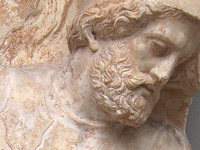
RESOURCES
This article uses material from the Wikipedia article "Third Macedonian War (171–168 BC)", which is released under the Creative Commons Attribution-Share-Alike License 3.0.
© Stories Preschool. All Rights Reserved.
